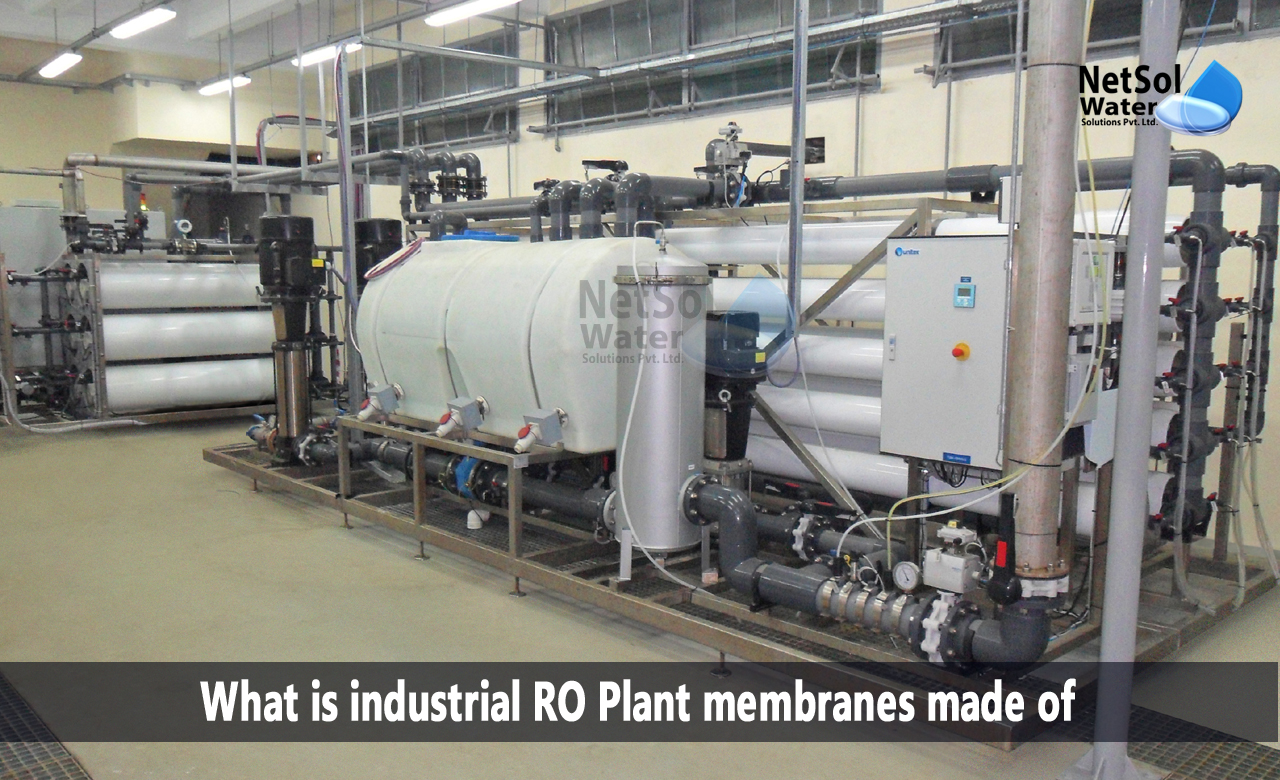The membrane is an extremely thin plate with incredibly small pores made of synthetic plastic. The kind of membranes used in the water purifications equipment’s determines how big the pores are.
The reverse osmosis RO water plant uses a type of membrane with the tiniest pores possible; because of this, pure water molecules can readily pass through because the membrane is only marginally larger, than a water molecule. This prevents the flow of organic compounds and bigger salt molecules.
The best filtering medium for water is a membrane. Pore sizes can be adjusted in water purification membranes, to maximize their effectiveness for the job at hand. Let’s see the composition of RO Plant membranes.
What is an industrial RO plant?
An industrial reverse osmosis (RO) plant is a water treatment facility that uses the reverse osmosis process, to remove harmful compounds and pollutants from water.
Permeate, or well-treated product water, is the water that passes through the semipermeable membrane. Reject, brine, or concentrate water is the term used to describe the water that is left behind the membrane, after the dissolved and suspended solids have been removed.
Industrial membrane types categorized by structure
Thin film composite (TFC or TFM) membranes and cellulose triacetate (CTA) membranes are two popular forms of RO membranes.
Filtration capability and chlorine resistance are the two types' key distinctions from one another. CTA membranes can withstand chlorine, however, they are prone to bacterial contamination and only remove 93% of common contaminants.
TFC/TFM membranes can only treat water that is chlorine-free but typically remove 98% of common pollutants, and are less prone to organic pollution. Use a carbon pre-treatment filter with a TFC/TFM membrane to purify chlorinated tap water. Membranes for brackish water, salt water, and brine can be utilized in municipal, industrial, and marine desalination applications.
What is industrial RO Plant membranes made of?
The majority of RO membranes in use today are typically made of a thin film composite membrane with three layers: a polyester support web, a microporous polysulfone interlayer, and an ultra-thin polyamide barrier layer on top.
Although, membrane configurations can vary, spirally wound hollow fiber membranes are most frequently utilized. The type of membrane chosen affects the device's performance and overall effectiveness. This comprises:
Low solids/liquids
These spaghetti-like membranes are composed of tens of thousands of hollow fibers, and they may be effectively kept clean using periodic backwashing and clean-in-place (CIP) procedures.
Plates and frames
In a plate-like device that gathers solids, these membranes are positioned inside a carrier plate. They may be less effective than other filtration techniques, and have a low packing density, but they are typically simpler to use and clean. They are also among the more expensive systems with cheaper membranes.
Spiral Wound
Spiral wound membranes are among the most often utilized. They are made up of flat membrane sheets sandwiched between spacers that resemble mesh, which are looped around a central tube and set inside a casing. They can be employed in high-volume applications with low suspended particles and are reasonably small.
Tubular
A pipe or shell is lined with a number of tube-like membranes, and as a stream passes through them, the permeate is transferred to the pipe or shell side.
TDS, TSS, oil, fat, and fatty ones are frequently employed for problematic streams, but can become less permeable at low packing densities.
Industrial RO Plant manufacturers
In order to select the most effective method for treatment and reuse, the various types of wastewater produced by each industry must be carefully evaluated. The challenges of rising process demand, legal compliance, water and discharge costs, and corporate sustainability initiatives, can be helped with Netsol Water.
With the help of our extensive equipment selections and deep application knowledge, engineers, consultants, and plant managers may purchase and deploy a complete solution, with little disruption to on-going operations.
Netsol Water is Greater Noida-based leading water & wastewater treatment plant manufacturer. We are industry's most demanding company based on client review and work quality. We are known as best commercial RO plant manufacturers, industrial RO plant manufacturer, sewage treatment plant manufacturer, Water Softener Plant Manufacturers and effluent treatment plant manufacturers. Apart from this 24x7 customer support is our USP. Call on +91-9650608473, or write us at enquiry@netsolwater.com for any support, inquiry or product-purchase related query.



